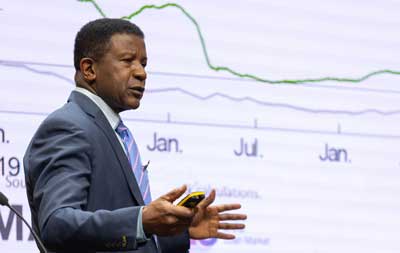 Last year was turbulent for the world economy, and this one may be no different. The Russian invasion of Ukraine in 2022 had its full effect in 2023, reducing real incomes by pushing inflation up, particularly for food and energy. In addition, the increase in interest rates put in place to fight the sharp rise in inflation slowed growth, raising the cost of borrowing for businesses and debt servicing for households. That left less money in their pockets, which meant that consumer spending suffered, and investment spending by companies was much lower than it would have been otherwise.
Last year was turbulent for the world economy, and this one may be no different. The Russian invasion of Ukraine in 2022 had its full effect in 2023, reducing real incomes by pushing inflation up, particularly for food and energy. In addition, the increase in interest rates put in place to fight the sharp rise in inflation slowed growth, raising the cost of borrowing for businesses and debt servicing for households. That left less money in their pockets, which meant that consumer spending suffered, and investment spending by companies was much lower than it would have been otherwise.
As a result, growth in the world economy slowed from 3.3% in 2022 to about 2.9% in 2023, or about ½%. UK economic growth is estimated at ½% in 2023, and only a tiny improvement to ¾% is expected this year, in line with the European average.
The only major economy that bucked the slowing trend in 2023 – and showed faster growth than the major developed economies – was the US, which expanded 2.8% in 2023, faster than in the previous year. Loose fiscal policy in the Pandemic carried over into 2023, and the US is self-sufficient in energy, so it did not suffer the real income loss of most other advanced economies.
However, this year, with much of that fiscal largess not repeated, US economic growth is expected to slow to about 1½%, in line with that for the average of advanced economies though still much higher than the UK’s. Meanwhile, global economic growth will also deteriorate from 2.9% in 2023 to 2.7% this year due to monetary and fiscal tightening lingering effects.
Focus on the UK
 However, there is no disguising the fact that the UK economy has been growing slowly since the Pandemic, though better than some earlier forecasts had predicted. Its output is about 1.4% above its pre-Pandemic peak, with only Germany of the G7 having a weaker performance, at just 0.3%. Though the UK grew by ½% in 2023, that was down from 4.3% in 2022, when it outpaced the US at 1.9% and the EU, which recorded 3.4%.
However, there is no disguising the fact that the UK economy has been growing slowly since the Pandemic, though better than some earlier forecasts had predicted. Its output is about 1.4% above its pre-Pandemic peak, with only Germany of the G7 having a weaker performance, at just 0.3%. Though the UK grew by ½% in 2023, that was down from 4.3% in 2022, when it outpaced the US at 1.9% and the EU, which recorded 3.4%.
Recent Office for Budget Responsibility (OBR) forecasts were used as the basis for the assumptions in the government’s November budget; they forecast the UK to expand by 0.7% this year and 1.2% in 2025. Interestingly, the Bank of England is more pessimistic, expecting only 0.1% growth last year and 0.2% this year. However, the figures will likely be revised to align with the OBR when the 1st February 2024 monetary report is issued. However, the big picture remains the same: the UK will grow barely more this year than last year and underperform the average of the major economies. Why is that?
First, the UK’s economic outlook is close to that of the European economies. Euro area growth was just 0.6% in 2023, and an improvement of only 0.2% last year to 0.8% is expected this year. That is in line with the UK numbers expected by the average of independent forecasters. As a group, Europe suffers from low productivity compared to the US (a lack of investment in R&D, sclerotic planning, etc.) and because it is more energy-dependent on Russia and because price inflation has risen so much, leaving interest rates higher than those reached in the US and the global average.
Second, the full effects of the interest rate hikes have yet to occur, so economic growth will remain under pressure this year and next. However, the good news is that inflation in the UK is now falling. A combination of lower energy prices, both food and energy, has yet to fully come through to the consumer price index. That fall in inflation has, combined with the rise in nominal wage growth, boosted real incomes and will support spending. Financial markets are also now pricing interest rate cuts due to the fall in price inflation, helping lower longer-term funding costs.
Third, price inflation is well below what the Bank of England expected at their November 2023 meeting, so financial markets now expect interest rate cuts by around spring. That will support businesses and consumers who will still face the lingering effects of higher long-term interest rates as those on fixed rates who renew this year will face a sharp rise; millions more people will be in this situation. Consumer price inflation is on course to hit the MPC’s target of 2% this year – by Q2 or Q3 – rather than in 2025, so interest rates should fall well below 4% by the end of the year.
Another challenging year
So, another challenging year looms for the UK. On top of that, the fiscal position in the UK is precarious, with tax increases outweighing tax cuts and the tax burden rising. Real incomes of households in the UK will fall again in 2024 due to the higher tax burden and the effects of more people paying tax, just as the cessation of the Pandemic spending reduces income.
But other positive news is that unemployment remains remarkably low at 4.2%. With an ageing population and skill shortages in critical sectors, pay growth should stay roughly in line with inflation. Although vacancies have fallen, there hasn’t been much of a rise in unemployment as employers hang on to staff, clashing with the view held by some that a surge in wage inflation must increase unemployment. An ageing population has broken any link.
That said, risks remain from the situation unfolding in the Red Sea, which could disrupt trade routes and raise oil prices, and the prospects of escalation in Ukraine. It is also an election year in the UK and amongst some 4.2 billion people worldwide. Who knows what it may throw up, even though many may not be free or fair?
However, challenging times give rise to opportunities, and it is notable that despite the many challenges of the last few years, global economic growth has been positive overall. Living standards are still rising as climate change, demographic trends, and the pace of technology change become ever more apparent. That indicates the challenges are being met and benefits from meeting them are and will accrue.

Trevor Williams
Trevor is a former Chief Economist at Lloyds Bank and provides insightful economics overviews and considers how politics, demographics and climate change are shaping the economy. In speeches, he makes complex economic theories and trends understandable and relevant to any organisation.
View Trevor William’s full speaker profile here.
To enquire about Trevor or another economics speaker for your next conference or to get advice tailored to your specific event needs, don’t hesitate to get in touch with us!